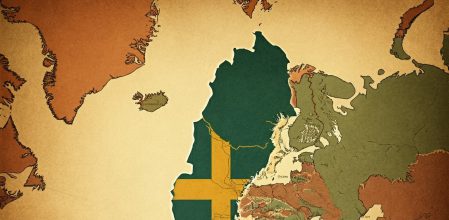By: Catrine
The world is changing! Globalization, technological advancements, and shifting power dynamics are reshaping the global landscape before our very eyes. While this brings exciting opportunities, it also generates new uncertainties (Melber et al., 2024).
In this blog I have an idea that I will try to highlight the link between the changing global landscape and the need for new perspectives in development studies, by connecting it to a sense of increased insecurity among Swedes. This is a way for me to question traditional thinking and explore alternative spaces and pathways for change (Schwittay, 2024).
Sweden Navigating a Shifting World
Looking at Sweden as an example of this changing world view. Sweden’s geographical location on the Scandinavian Peninsula has historically provided a significant geopolitical advantage. Its distance from major conflicts, together with its surrounding seas and sparsely populated neighboring regions, used to foster a sense of security and stability. This allowed Sweden to maintain neutrality during major 20th century conflicts. However, the 21st century presents new challenges to this traditional sense of security. Globalization, shifting global power dynamics, and the rise of transnational threats are redefining the geopolitical landscape, making distance a less reliable guarantor of safety (Melber et al., 2024). The COVID-19 pandemic served as a reminder of this reality, demonstrating how quickly a health crisis in one part of the world can disrupt economies and societies globally (Worls Bank, 2021).
Furthermore, the increasing speed and ease of information flow means that events in distant regions can have immediate domestic political and social repercussions (Melber et al., 2024).The ongoing war in Ukraine is an example of this. The war has impacted on Sweden, both in terms of its security policy and its domestic politics. The media has covered the war, providing citizens with up-to-date information and analysis on the conflict, which has created concern among many people.
Because of this uncertainty, we need to rethink our old ways of doing things, including how we think about development. For a long time, the study of development has been controlled by western ideas. But to really understand today’s world, people need to listen to the voices of people who have been ignored and pushed aside (Bendix, 2020).
By learning from different perspectives, we can better understand why we feel insecure and find new ways to deal with global problems. Decolonizing development studies means questioning the dominant western perspectives and incorporating the voices of those who has not yet been heard (Bendix, 2020).
The Shifting Landscape of Development Studies
Development studies and geopolitics are two distinct fields of study, but they are increasingly linked together following the changes of the world. Decoloniality has emerged as a powerful framework for challenging the colonial legacies that continue to shape development studies. A decolonial approach seeks to deconstruct the western ideas that underpin the field and amplify the voices of others (Bendix, 2020).
Development is about more than just using knowledge. It’s also about values, emotions, and doing what’s right. We need to consider people, their feelings, and what they have to say. We need to question our own beliefs and how we see the world, including how we see others as well as ourselves. We need to challenge our assumptions and really listen to those who have been ignored and silenced for too long. Only then can we truly understand and create meaningful change (Melber et al., 2024).
By listening to and understanding the experiences of those who have been historically marginalized and impacted by global power imbalances, Swedes might gain a better understanding of the sources of their own insecurities. This understanding can lead to more effective and empathetic responses to global challenges.
Conclusion
In conclusion, the world is changing rapidly, and Sweden, despite its historical positioning, is not immune to these shifts. Globalization, new technologies, and the rise of new powers create a sense of insecurity, challenging traditional notions of safety and development. To navigate this new landscape, it is crucial to embrace new perspectives in development studies, particularly those rooted in decolonial thought. By understanding and incorporating the experiences of people worldwide, Swedes can gain a deeper understanding of global power dynamics and the interconnected nature of global challenges. This understanding can foster empathy, solidarity, and more effective responses to global issues, ultimately contributing to a more just and secure future for all.
Many of you readers will probably think that this blogpost and my attempt to talk about such a complex and important topic from my own Swedish perspective is going too far. However, I felt that in a blog you should be able to push the boundaries a bit, and I hope that this blogpost gave you a nudge to start thinking outside your own box.
In my next blog I will look at the changing geopolitical landscape and the way it creates challenges for the media. The media is under pressure to be more responsive to the needs and interests of its audience. This can lead to tension between the commitment to objectivity and impartiality and the need to be engaging and relevant. I will also look at the loss of media since Miriam is currently in Mozambique where protests are making the streets unsafe. Yet we are not informed about these events in Sweden. I have only heard of it one time on the news since the protests began…. Read more about this in Miriam’s blog.
If you want to read more:
Bendix, Daniel; Mueller, Franziska; Ziai, Aram (eds.) (2020): Beyond the Master’s Tools? Decolonizing Knowledge Orders, Research Methods and Teaching, Lanham, MA: Rowman & Littlefield.
Melber, Henning Melber; Kothari, Uma; Camfield, Laura & Kees Biekart (eds.) (2024): Challenging Gobal Development-Towards Decoloniality and Justice. Cham: Palgrave Macmillan.
Schwittay, Anke (2024): University Work Experiences in International Development: Expanding Locations, Spaces and Pathways, Progress in Development Studies, 24(3), 252-267.
World Bank (2021): https://documents1.worldbank.org/curated/en/511111640017525158/pdf/Exploring-the-Growth-Effects-of-COVID-19-across-Developing-Countries.pdf

